News & Stories
2016
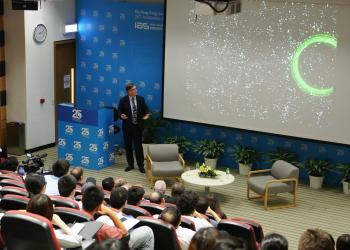
News
Nobel Laureate in Physics Prof George Smoot Discusses Discovery of Gravitational Waves and its Way Forward at HKUST 25th Anniversary Distinguished Speakers Series
The Hong Kong University of Science and Technology (HKUST) hosted the 25th Anniversary Distinguished Speakers Series today, featuring Prof George Smoot, Nobel Laureate in Physics 2006 and IAS Helmut & Anna Pao Sohmen Professor-at-Large of HKUST. The event was well received by students, faculty members and guests from HKUST.
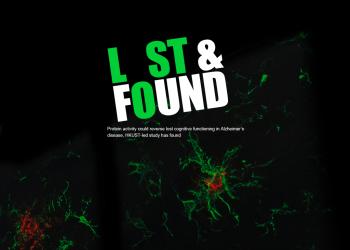
News
Lost and Found
HKUST researchers, collaborating with colleagues from Zhejiang University and the University of Glasgow, have found that the protein interleukin-33 (IL-33) reduces memory loss and other aspects of cognitive decline in conditions similar to Alzheimer’s disease (AD). With 46.8 million people around the world affected by AD and the number rising, the enormous burden on patients, their care-givers and health systems could soon be alleviated.
Mainly affecting the elderly, AD involves memory loss and impaired reasoning, judgment and movement. Research team leader Prof. Nancy Ip, Dean of Science, Director of the State Key Laboratory of Molecular Neuroscience and the Morningside Professor of Life Science, described the disease as an “urgent health threat”, particularly in Hong Kong with its rapidly aging population.
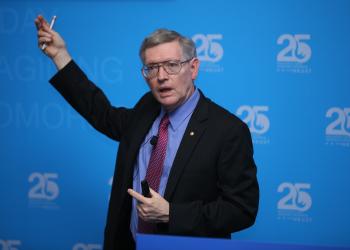
News
Nobel Laureate in Chemistry Prof William E Moerner Shares Insights on the Development of Super-resolution Microscopy at HKUST 25th Anniversary Distinguished Speakers Series
The Hong Kong University of Science and Technology (HKUST) hosted the 25th Anniversary Distinguished Speakers Series on 16 May, featuring Prof William E Moerner, Nobel Laureate in Chemistry 2014. The event was well received by students, faculty members and guests from HKUST.
In his talk titled “The Story of Single Molecules: How Precise High-resolution Spectroscopy at Low Temperatures Led to Super-resolution Microscopy and Beyond”, Prof Moerner shared with the audience today’s development of super-resolution microscopy since the 1980s when the first optical detection and spectroscopy of a single molecule in the condensed phase was observed.
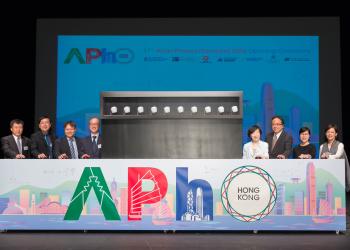
News
HKUST hosts first Asian Physics Olympiad in Hong Kong
The Hong Kong University of Science and Technology (HKUST) is hosting the grand physics competition in Asia – the 17th annual Asian Physics Olympiad (APhO) – for the first time in Hong Kong in the largest scale ever. This is also one of the many activities celebrating HKUST’s 25th Anniversary.
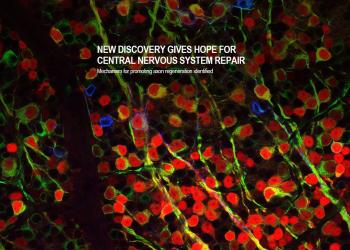
News
New Discovery Gives Hope for Central Nervous System Repair
HKUST scientists along with colleagues from the Institute of Neuroscience in Shanghai and Sun Yat-Sen University in Guangzhou have discovered a strategy for repairing injured neurons through the regeneration of axons, a normally rare occurrence. This raises the exciting possibility of reversing injuries to the central nervous system.
Led by Dr. Kai Liu, Assistant Professor at HKUST’s Division of Life Science, the team recently demonstrated that damaged optic nerves that transmit visual information from neurons in the eye to other neurons in brain could regenerate when treated with either an optical or a chemical stimulant. In mouse experiments they achieved this through the overexpression of both the light-sensing molecule melanopsin and that of Designer Receptor Exclusively Activated by Designer Drugs (DREADD), a tool normally used to enhance neuronal activity.
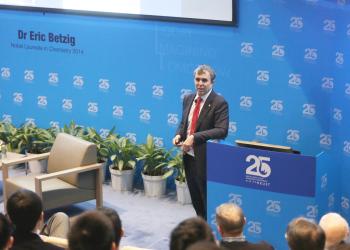
News
Nobel Laureate in Chemistry Dr Eric Betzig Speaks on Imaging Life at High Spatiotemporal Resolution at HKUST 25th Anniversary Distinguished Speakers Series
The Hong Kong University of Science and Technology (HKUST) hosted the 25th Anniversary Distinguished Speakers Series today, featuring Dr Eric Betzig, Nobel Laureate in Chemistry 2014. The event was well received by students, faculty members and guests from HKUST.
In his talk titled “Imaging Life at High Spatiotemporal Resolution”, Dr Betzig told the audience the latest development of microscopy, he said, “As our understanding of biological systems has increased, so have the complexity of our questions and the need for more advanced optical tools to answer them.” He added that there was a hundred-fold gap between the resolution of conventional optical microscopy and the scale at which molecules self-assemble to form sub-cellular structures.
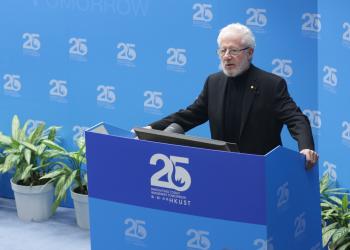
News
Nobel Laureate in Chemistry Prof Alan J Heeger Shares Insights on Creativity and Discovery in Science at HKUST 25th Anniversary Distinguished Speakers Series
The Hong Kong University of Science and Technology (HKUST) hosted the 25th Anniversary Distinguished Speakers Series today, featuring Prof Alan J Heeger, Nobel Laureate in Chemistry 2000. The event was well received by students, faculty members and guests from HKUST.
In his talk titled “Creativity, Discovery and Risk - Nobel Prizes Past and Future”, Prof Heeger shared his insights on creativity and discovery in science, and the close association of creativity with risk-taking in scientific research. He said, “In science, creativity and discovery are related, but they are not the same. Scientific breakthroughs typically result from a combination of creativity and discovery.” He cited some Nobel Prize-winning scientific findings as examples to illustrate creativity, including his early discoveries in the field of semiconducting and metallic polymers.
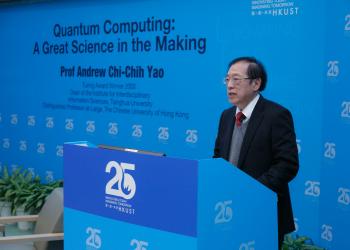
News
Turing Prize Winner Prof Andrew Chi-Chih Yao Explores Development of Quantum Computing at HKUST 25th Anniversary Distinguished Speakers Series
The Hong Kong University of Science and Technology (HKUST) hosted the 25th Anniversary Distinguished Speakers Series on 28 January, featuring Prof Andrew Chi-Chih Yao, the only Chinese Turing Prize winner.
In his talk titled “Quantum Computing: A Great Science in the Making”, Prof Yao told the audience the secrets in the atoms that could potentially unleash the enormous power of quantum computing. He also delved into the advantages of quantum computing and shared his insights into how it will revolutionize information processing.
“Quantum computer comes at a fortuitous time when the Moore’s law for computing is starting to reach its physical limit imposed by quantum mechanics. The design of quantum computer offers a daring approach: to take advantage of the quantum problem instead of fighting it,” he said.






